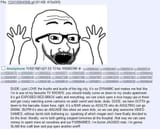Anonymous
ID: /rMCCldd
7/22/2025, 10:04:16 PM No.511075977
if you are NON smoker
complete mystery
https://www.nytimes.com/2025/07/22/well/lung-cancer-nonsmokers.html
So few people today are smokers that lung cancer sufferers in USA are now highly likely to actually be non smokers.
Roughly 25% of lung cancers now occur in people who have never smoked, according to researchers at the National Cancer Institute.
Among certain groups of Asian and Asian American (Asian American is mixed with white) women, that share reaches 50% or more. Scientists studying 871 nonsmokers with lung cancer found that certain DNA mutations were significantly more common in people living in areas with high air pollution levels.
The research, published in Nature this month, revealed that pollution both directly damages DNA and causes cells to divide more rapidly. The biology of cancer in nonsmokers differs from smoking-related cases and may require different prevention and detection strategies.
>It probably comes from environmental pollutants put out by chemical plants onto the air.
Nonsmokers with lung cancer are more likely to have specific "driver" mutations that can cause cancer, while smokers tend to accumulate many mutations over time.
Current U.S. screening guidelines recommend routine testing only for people ages 50 to 80 who smoked at least one pack daily for 20 years.
complete mystery
https://www.nytimes.com/2025/07/22/well/lung-cancer-nonsmokers.html
So few people today are smokers that lung cancer sufferers in USA are now highly likely to actually be non smokers.
Roughly 25% of lung cancers now occur in people who have never smoked, according to researchers at the National Cancer Institute.
Among certain groups of Asian and Asian American (Asian American is mixed with white) women, that share reaches 50% or more. Scientists studying 871 nonsmokers with lung cancer found that certain DNA mutations were significantly more common in people living in areas with high air pollution levels.
The research, published in Nature this month, revealed that pollution both directly damages DNA and causes cells to divide more rapidly. The biology of cancer in nonsmokers differs from smoking-related cases and may require different prevention and detection strategies.
>It probably comes from environmental pollutants put out by chemical plants onto the air.
Nonsmokers with lung cancer are more likely to have specific "driver" mutations that can cause cancer, while smokers tend to accumulate many mutations over time.
Current U.S. screening guidelines recommend routine testing only for people ages 50 to 80 who smoked at least one pack daily for 20 years.
Replies:



